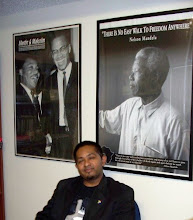
People are on a journey when it comes to faith. Some admit to being on a journey, while there are those who state they have arrived. In my journey of faith or to faith, the notion of arriving at a solid base is more a myth than a reality. Values or guiding principles remain constant, but even these platforms are dynamic and not static, for they grow and develop as one journeys on.
“Slumdog Millionaire”, a Hollywood hit presents a journey of a central Character Jamal. Jamal is depicted as having his beginnings in the Slums of Mumbai and goes on to become a millionaire. One specific scene caught my attention, when violence broke out resulting in the death of Jamal’s mother. The scene captured violence fueled by religious factions, where Hindus attacked Muslims.
In making mention of this scene it is not intended to propel a villain and victim scenario related to religious intolerance. It is however intended to point out a theme of religious rivalry, which results in human rights abuses. Jamal is interrogated because he is suspected of cheating on the show “Who wants to be a millionaire?”. During the interrogation he reflects on the death of his mother. Jamal explains that if it were not for Rama and Allah, he would still have a mother.
We are living in a world of historic battles fought in the course of pursuing faith. The role of religion is clearly noted in the crusades, slavery, colonialism, Nazism, Apartheid, and the Spanish conquests. Let me not fail to mention the ongoing strife between Israel and Palestine, or the militants of Sudan-Dafur region, who continue carrying out acts of genocide. Our world continues to be plagued by numerous global religious-ethnic factions. The work and ministry of reconciliation must encourage people to see religious warring as a major contributor to violence, and continued human rights violations in our 21st century world.
On Sunday morning the 8th of July, 2007 I was ordained at my local church in Johannesburg, South Africa. Pastor Russel Abrahams my local pastor since age fifteen officiated the ordination service. The ordination service symbolically confirmed the prayers of my grandmother who fervently committed me as her grand child to God. It also presented an affirmation to my parents, and community for their support in allowing me to serve the work of bringing the good news of Jesus Christ and expressing God’s love to the world.
Following the ordination prayer of commitment and commissioning, I delivered my ordination response. My response was then followed by a keynote address delivered by my friend and mentor Ismail Vadi. Ismail is a member of government and comrade within the African National Congress. More especially Ismail is a committed Muslim. I am grateful to God for an ordination service that brought one of Muslim faith to speak on behalf of one of Christian faith. Family members and friends are sometimes critical of my inter-religious work. On this morning however, one amongst many expressed that it was quite an experience to witness the presence of God as realized through the words from a religious other.
Let us consider the words of Chung Hyun Kyung who reflects upon and advocates for Asian women theology as birthed in struggle for liberation. Kyung explains the need for moving from religious plurality to religious solidarity. Kyung states: “My third hope for the future of Asian women’s theology is that it go beyond accepting religious pluralism through interreligious dialogue toward religious solidarity and also toward revolutionary praxis in the people’s struggle for liberation.”
Kyung recognizes the importance of plurality in fighting fascist, imperialist mentality that fosters exclusivity of one’s own claim truth. Acceptance of plurality has the potential to ease the chaos in an environment of diverse manifestations of the divine but plurality is not enough! Asian women have to go beyond plurality toward solidarity if they are to join in the struggle for the liberation of all Asian women. Kyung accuses plurality of being lazy and irresponsible when it cannot mobilize women from diverse backgrounds toward common projects that will defy historical systems of injustice.
Drawing from the inspiring theology of Asian women as advocated by C.H. Kyung, I am convinced that the work and ministry of reconciliation, and the notion of a contextual reconciliation theology, calls people to consider moving from plurality to solidarity. For it is in this moving from plurality toward solidarity that the- I and the- other, enter into a sacred space of commonality. In the sacred space we understand that we are different, but our difference cannot divide us in pursuing the liberating message of the good news.
C.H. Kyung, The contribution and the future of Asian women’s theology, In Struggle to be the sun again: Introducing Asian women’s theology (Maryknoll, NY: Orbis, 1990), 112-113.


1 comment:
Seth -
I so appreciate your thoughts, and the journey they represent - As we talked the other night about these issues of "solidarity" I began to consider, how it is that I have been able (or challenged) to move from ignorance and stereotypes - to awareness, tolerance and even respect - to solidarity and true community...
I'm convinced it requires relationships that are mutual and not patronizing - and a willingness to separate ourselves from privilege / communal "rights" that our separate groups afford us by demands they put on us.
I don't know if this makes sense... but we won't get there without shifting our relational world and our social allegiances ... but let me know your thoughts
Post a Comment